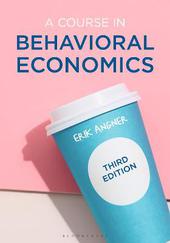
|
A Course in Behavioral Economics
Paperback / softback
Main Details
| Title |
A Course in Behavioral Economics
|
| Authors and Contributors |
By (author) Erik Angner
|
| Physical Properties |
| Format:Paperback / softback | | Pages:352 | | Dimensions(mm): Height 240,Width 168 |
|
| Category/Genre | Economic theory and philosophy
Microeconomics |
|---|
| ISBN/Barcode |
9781352010800
|
| Classifications | Dewey:330.019 |
|---|
| Audience | | Tertiary Education (US: College) | |
|---|
| Edition |
3rd edition
|
|
Publishing Details |
| Publisher |
Bloomsbury Publishing PLC
|
| Imprint |
Bloomsbury Academic
|
| Publication Date |
27 November 2020 |
| Publication Country |
United Kingdom
|
Description
This textbook looks at decisions - how we make them, and what makes them good or bad. In this bestselling introduction, Erik Angner clearly lays out the theory of behavioral economics and explains the intuitions behind it. The book offers a rich tapestry of examples, exercises, and problems drawn from fields such as economics, management, marketing, political science, and public policy. It shows how to apply the principles of behavioral economics to improve your life and work - and to make the world a better place to boot. No advanced mathematics is required. This is an ideal textbook for students coming to behavioral economics from various fields. It can be used on its own in introductory courses, or in combination with other texts at advanced undergraduate and postgraduate levels. It is equally suitable for general readers who have been captivated by popular-science books on behavioral economics and want to know more about this intriguing subject. New to this Edition: - An updated chapter on behavioral policy and the nudge agenda. - Several new sections, for example on the economics of happiness. - Updated examples and exercises, with an expanded answer key - Refreshed ancillary resources make for a plug and play experience for instructors teaching behavioral economics for the first time.
Author Biography
Erik Angner is Professor of Practical Philosophy at Stockholm University, where he directs the Philosophy, Politics, and Economics (PPE) Program. As a result of serious mission creep, he holds two PhDs - one in Economics and one in History and Philosophy of Science - both from the University of Pittsburgh. He is the author of one monograph and multiple journal articles and book chapters on behavioral and experimental economics, the economics of happiness, and the history, philosophy, and methodology of contemporary economics. He lives in Stockholm with his wife and their three children.
ReviewsThis is an exceptionally clear guide to the alternative ways economists can approach decision-making and choice. It presents a thorough introduction to both standard and behavioural theories of decision-making, equipping readers to understand the issues raised by 'nudge' policies as opposed to their more conventional alternatives. * Diane Coyle, University of Cambridge, UK * Erik Angner has written a wonderful introductory overview of behavioral economics. This book has a unique balance between accessibility and precision, which enhances a good understanding of the key concepts in behavioral economics. It has a concise style with many examples and exercises, and thereby is a great book for teachers and students. * Kirsten Rohde, Erasmus University Rotterdam, The Netherlands * This text combines a succinct yet rigorous outline of standard choice theory with a lively and engaging discussion of many key findings and concepts of behavioral economics. I especially welcome its discussion of how these insights may be used (and abused) in government and business alike. * Stephen L. Cheung, University of Sydney, Australia *
|